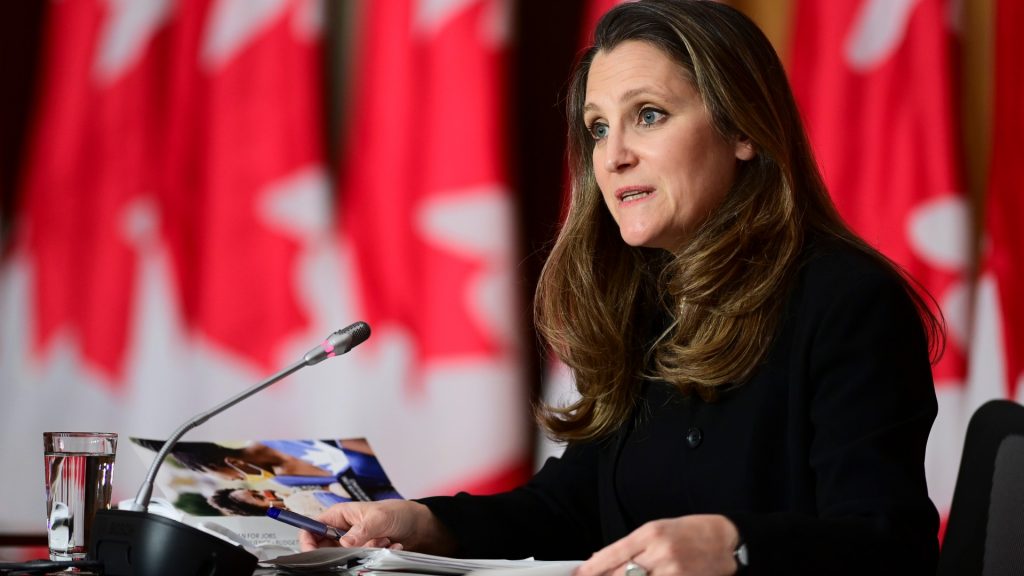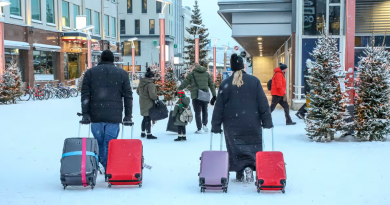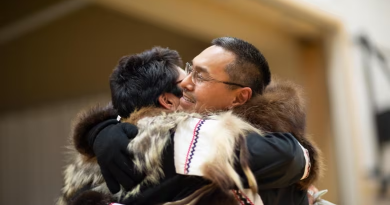Health, climate among northern highlights from Canadian budget

Caroline Cochrane, the premier of Canada’s Northwest Territories (NWT), watched the federal budget announcement Monday, in hopes the spending would address pressings issues including housing, equality, the climate crisis and child care.
In a post to Twitter Monday afternoon, Cochrane said she is “optimistic” with what she’s heard so far from Minister of Finance, Chrystia Freeland.
“Canada understands the impact the pandemic has had on the North,” her tweet read.
“It has laid bare the gaps in our society, and this budget addresses several shared priorities.”
The budget document came in at 739 pages with a staggering scope. It reveals that, over the past year, Canada ran up a deficit of $354.2 billion and plans to follow that up next year with a reduced deficit of $154.7 billion that is supposed to gradually decline to $30.7 billion in 2025-26.
Part of the proposed national budget, announced by Freeland, promises an investment of roughly $30 billion over five years to help offset the cost of early learning and child care services.
In her budget address, Freeland said these key investments will pay themselves off through economic recovery, job creation and social infrastructure. She said women’s participation in Canada’s workforce has declined to its lowest in two decades as a result of women taking on a disproportionate amount of child care responsibility during COVID-19.
It’s hoped it will cut child care costs in half by the end of next year, and by 2025, child care should cost parents just $10 a day.
Cochrane is set to provide her full reaction to Canada’s 2021 budget on Tuesday.
Here’s a roundup of northern-specific highlights from the budget.
Health
The budget includes $100 million over three years for innovative mental health intervention for people that have been disproportionately affected by COVID-19 in the country. That includes health care workers, people on the front line, youth and elderly, as well as Indigenous people, and racialized and Black Canadians.
There will also be $50 million to Health Canada to spend on the emergence of post traumatic stress disorders related to the trauma of COVID-19.
In the North, health care will see $54 million placed to rejuvenate the territorial investment fund. That’s $27 million to Nunavut, $12.8 million to Yukon and $14.2 million to the N.W.T.
Equality
There will be $163 million spent on food insecurity for Nutrition North and there’s notable investments to go toward Missing and Murdered Indigenous Women and Girls and for the implementation of Gladue principles.
That includes $724 million for a comprehensive violence prevention strategy and another $49 million to implement the Gladue principles and to address the crisis of overrepresentation of Indigenous people in Canadian prisons.
There is also $8 million to develop Indigenous-led community justice.
Pauktuutit Inuit Women of Canada says the budget came with positive news for Inuit Women.
In a news release on Monday, the organization said it was “pleased to see funding set aside for the construction and operation of transition housing specifically for Inuit women, which would be in addition to new funding for Inuit-specific safe shelters announced earlier this year by the federal government.
“Pauktuutit Inuit Women of Canada is encouraged to see funding for transition housing and shelters for Inuit women and the pledge by the federal government of $2.2 billion toward ending the tragedy of missing and murdered Indigenous women and girls,” said Rebecca Kudloo, president of Pauktuutit, in a statement.
Kudloo also pointed out that the budget included new permanent funding for affordable childcare programing, Inuit-specific funding for children’s early learning, as well as more money for post-secondary education for Inuit women.
The organization says the increased funding for Indigenous women’s and 2SLGBTQ organizations from the budget will mean security of multi-year operational funding from the federal government for the “first time in its 36-year history.”
Climate change
There is spending targeted to get cleaner power to Northern communities and cut emissions at mining sites.
This budget includes $40 million for hydro and grid projects in the North, like the Atlin Hydro Expansion in Yukon and the Kivalliq Hydro Fibre Link in Nunavut.
There will be $36 million for clean energy projects in First Nations, Inuit and Métis communities.
There is $1.4 billion over 12 years earmarked for disaster mitigation and adaptation. Of that, $670 million will go to small-scale projects worth between $1 million and $20 million for communities trying to adapt to climate change.
There will be $17.4 million over two years to build up a national Canada Water Agency to improve the way Canada monitors and manages water.
There will also be $11 million to support initiatives like flood mapping in the North, along with $28 million to map out areas that are at risk of increased forest fire activity, one of the predicted effects of climate change.
Yukon will get $25 million for its climate change priorities.
CPAWS Yukon posted to Twitter that it was “delighted” by the federal government’s investment in nature.
“The new territorial government will have a golden opportunity to start fresh with ambitious conservation targets and to grow the Yukon’s green economy,” the post read.
Education
There is a proposed $2.5 billion investment in Indigenous early learning and childcare over the next five years. That includes investments in Aboriginal Head Start, which is an early intervention preschool program.
There will be $264 million to repair and renovate existing child care centres and $420 million to build new ones.
Aurora College, to be transformed into a polytechnic, is set to receive $8 million.
Infrastructure
The government projects spending $1 billion over 6 years for the universal broadband fund, to accelerate access to high-speed internet in rural and remote communities.
The National Trade Corridors Fund will get almost $2 billion, and $285 million of that will go into Canada’s North.
Related stories from around the North:
Canada: Inuit in Arctic Quebec moving ahead on self-determination talks, Eye on the Arctic
Finland: US missiles: Finnish, Russian presidents call for dialogue at Helsinki meeting, Yle News
Greenland: Political upheaval in Greenland — What does Inuit Ataqatigiit do now?, Eye on the Arctic
Iceland: Iceland & UK sign agreement to boost security, defence cooperation, Eye on the Arctic
Norway: Norway absent from massive US-led multinational drill in Europe next year, The Independent Barents Observer
Sweden: Nordic Day a time to reflect on cooperation shortfalls during pandemic, say some experts, Radio Sweden
United States: NORAD modernization to dominate agenda of Canada-U.S. defence relations, experts say, Eye on the Arctic



